
|
|
DR CONGO
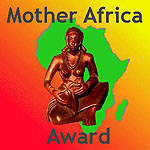
|
|
|
|
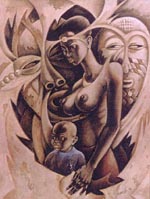 (c)art:
(c)art:
Lemba Pelo
|
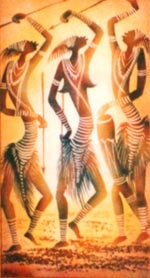 (c)art:
(c)art:
Tukokana Dikizeko
|

|
|
|
Official Name
|
Democratic Republic of Congo
|
|
Located
|
Central: Namibia, Zambia, Congo/Zaïre
|
|
Capital
|
Kinshasa
|
|
Head of State |
President Joseph Kabila
|
|
Area
|
2,345,410 sq km
|
|
Population
|
50 million
|
|
Growth rate
|
1.3%
|
|
Languages
|
French, Lingala, Kingwana (a dialect
of Kiswahili), Kikongo, Tshiiluba.
|
|
Currency
|
Franc Congolais
|
|
GNP per capita
|
$490
|
|
Inflation
|
150% !!
|
Airlines
|
from Europe & U.S.A.: Brussels Airlines
from Asia: ________________
from USA: ________________
|
Hotels
(advertise here)
|
Names & Rates per night
______________________
______________________
|
|
USAfrica Agent
|
______________________
|
|
Country Advertiser
|
If you want to become
the Country Advertiser
your logo comes here.
|
|
|
The Democratic Republic of the Congo is the new name for a nation that in 1997 saw the collapse of a corrupt, thirty-year dictatorship. Formerly called Zaire, the Democratic Republic of the Congo has had a volatile history marked by colonialists and tyrants trying to exploit the territory's vast resources. The Congalese - from the capitalists operating the copper and diamond mines to the hunting-and-gathering Pygmy people of the Ituri forests - cling to what they know: their strong extended families, resourcefulness and savvy, religion, and even some tribal superstition.
|
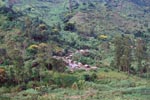
Near Lake Goma
©1988-2002: Africa Focus
|
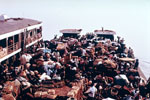
©1998-2002: Africa Focus
|
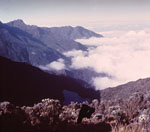
Ruwenzori Mountains
©1973-2002: Africa Focus
|
|
|
The heart of the African tropics, DR Congo/Zaïre, the Amazonian of Africa, is covered with endless rainforest, mountains, volcanoes, enormous rivers and abundant wildlife. The friendliness of the locals is remarkable and for the real African live music, one has to be in Kinshasa. Mountain Gorillas, chimpanzees and volcanoes can be found in Parc National des Virunga. Lowland gorillas have their home in Parc National de Kahuzi-Biega. The Great lakes of Tanganyika, Kivu, Edward and Albert are located near DR Congo's borders. Le Grand Pousseur is The Congo riverboat between Kinshasa and Kisangani and is one of Africa’s classic journeys. It’s essentially a floating village. There can be up to 2000 people on board. The Congo River is the second longest river in Africa. The Congo or Zaïre River is 4,375 kilometers (about 2720 miles) long and is up to 16 kilometers (10 miles) at its widest point. The river contains some 4000 islands, some as long as 16 kilometers (10 miles). It forms the boundary between the Congo and Zaïre. It is navigable for large stretches of its length but only a distance of about 130 kilometers (80 miles) from the sea. The river is Africa's great artery to Zaïre and the Congo and is the main "road" to the interior.
|
Kinshasa:
|
Kinshasa is the capital city of DR Congo, which was formerly known as Zaire. It is located on the southern bank of the river Congo. In colonial times, all the way up to 1966, the city was known as Léopoldville. Léopoldville was established by the British Sir Henry Morton Stanley as a depot in 1881. Stanley worked as a roving journalist for a US newspaper, before being hired by king Léopold II to become one of the main central Africa explorer. From then on, Leopoldsville grew rapidly after 1898, when a railway project was completed and became the largest city in the country. It was part of the Belgian Congo, which King Leopold II of Belgium controlled. Ultimately, independence was granted to the Democratic Republic of Congo in 1960. In recent times, the country has gone through intense political turmoil and revolts that were still continuing as of December 2001. Even Kinshasa has suffered due to this. Kinshasa, in spite of the trouble, has remained as the financial, commercial and industrial center of the country. Apart from the service sector, there are manufacturing industries and light industries, which produce beverages, textiles, tires, metalwork, paper, chemicals. With a population of over 4.5 million people, it is a huge city, and used to be a vibrant center of African music. Kinshasa also has the Université de Kinshasa, the largest college campus of the country, along with other schools and colleges specializing in a variety of fields.
|
|
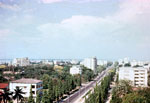
Kinshasa: Boulevard 30 Juin
©1960-2002: Africa Focus
|

Statue Henry Morgan Stanley
©1960-2002: Africa Focus
|
|
Kisangani:
Until 1966, Kisangani used to be called Stanleyville. The city was established in 1883 and was called Stanleyville after Sir Henry Morton Stanley. It is located along the Congo river, in what was earlier Zaire. This city has many industries, some of which are brewing, furniture making, agriculture etc. A hydroelectric dam, universities and an international airport serve the city.
Economy:

Hardwood on Train
©1988-2002: Africa Focus
|

©1985-2002: Africa Focus
|
|
|
The DRC has the third largest population, and the second largest land area in Sub-Saharan Africa. It is rich in natural and human resources, including the second largest rain forest in the world, fertile soils, ample rainfall, and considerable and varied mineral resources. Historically, mining of copper, cobalt, diamonds, gold and other base metals, zinc, and petroleum extraction accounted for about 75 percent of total export revenues, and about 25 percent of the country’s GDP. The country’s formal economy has virtually collapsed in the last few decades due to mismanagement and instability. The economy is mostly agricultural, based on coffee and cassava. Enormous potential mineral wealth with deposits of gold, silver, diamonds, copper, cobalt, zinc, tantalum and uranium but much of the mining sector collapsed at the start of the 1990s after looting. UN reports have since spoken of the systematic pillaging of the country's wealth by belligerents on both sides. The conflict has completely destabilised the economy and exports have been badly hit, while the late Kabila said 80 percent of the country's resources were required to finance the war. In October 2000, the UN World Food Programme estimated that the
socio-economic fabric was "completely devastated". Central Bank estimates showed inflation running at a staggering 520 percent in 2000. GNP: 110 US dollars per capita (World Bank, 1998). EXTERNAL DEBT: 11.645 billion dollars (World Bank, 2000). ARMED FORCES: Estimated at 81,400 men by the International Institute of Strategic Statistics (2002).
|
History:
|
The precolonial past of the Democratic Republic Congo (Zaïre) was complex. A diversity of social aggregates developed, ranging from small, autonomous groups of hunters and gatherers to centralized chiefdoms, from settled indigenous village communities to predominantly Muslim and Arab trading communities. Established in the late 1300s, the Kongo Kingdom expanded until the mid-17th century. The Luba Empire was founded by NKongolo and Kalala Ilunga in mid-17th century. Other Luba chiefs, including Lunda, settled among neighboring people and introduced the concept of a state governed by divine kingship. The Luba Empire was noted for its artistic achievement in sculpture, praise poetry, and polyphonic music. In the early 1500s, Kongo King Affonso established relations with Portugal and declared Roman Catholicism the state religion. The Kuba Kingdom, founded in the 17th century, by King Shyaam aMbul aNgoong, was a highly centralized agricultural and trading state. The Kazembe Kingdom was founded in 1750s as a Lunda offshoot, following Lunda expansion and controlling salt pans and copper mines in Katanga. The Conference of Berlin held in 1884 to 1885, acknowledged Leopold II's claim to rule the Congo Free State.
|
|
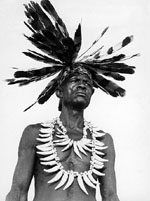
Lokele Elder
©1947-2002: Africa Focus
|
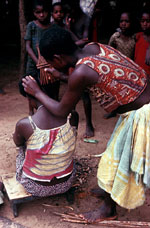
Combing hair
©2001-2002: Africa Focus
|
|
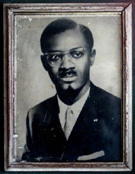
Patrice Lumumba
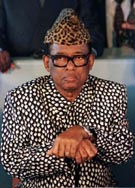
Mobutu Sese Seko
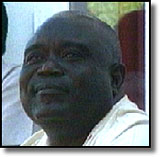
Laurent Kabila
|
|
|
Belgian Congo wins independence on June 30, 1960 and is renamed the Federal Republic of Congo. Joseph Kasavubu became the country’s President, Patrice Lumumba the Prime Minister, and Joseph-Désiré Mobutu (Mobutu Sese Seko) the State Secretary. The Federal Republic of Congo is renamed the Democratic Republic of Congo. In January 1961, Mr. Lumumba is assassinated, and in 1965, after years of rebellion, Mobutu seizes power. His dictatorial rule would last 32 years. On October 27, 1971, Congo changed its name to Zaïre. Zaire's cities and citizens take African names and the capital's name is changed from Leopoldville to Kinshasa. In 1992, Zaire is gripped by economic collapse.
In 1996, the Zairian government threatens to expel the Zairian Tutsis, who had engaged in low-level clashes with government troops for years. Rebel leader Laurent Kabila's anti-Mobutu party merges with Zairian Tutsis and other groups to form the Alliance of Democratic Forces for the Liberation of Congo-Zaire (AFDL). In April 1997, Zairian rebels push into Lubumbashi, and President Mobutu Sese Seko turns to the military in an attempt to maintain his slipping hold on power. In May, Kabila and Mobutu meet as rebel forces move toward Kinshasa. Mobutu cedes power and flees Kinshasa.
Rebels enter Kinshasa with little resistance and Kabila takes power in May 1997. Kabila's forces consolidate power and some Mobutu supporters are killed. Kabila's alliance changes Zaire's name to the Democratic Republic of Congo.
|
Kabila declares himself president and bans all politics, but promises elections in 1999. On June 1, 1998 the cabinet was expanded to over 30 ministries, with a broad ideological spectrum from Maoists to moderates. Ministerial decisions require Presidential clearance. In June 1998, the Congolese franc is launched to replace Mobutu-era New Zaire as part of currency reform. In August 1998, a rebellion by ethnic Tutsis in collaboration with ex-Mobutu army elements, and backed by Rwanda and Uganda, gains controls of much of eastern Congo; other rebel groups control much of the North; their advance on Kinshasa from a Western Front was reversed by armed assistance from Angola, Zimbabwe, and Namibia. Peace talks led to a peace accord signed in Lusaka in July 1999 between the Government and the neighboring countries involved in the conflict. In August, both rebels movements signed the peace accord in turn. In August, the armies of allies Rwanda and Uganda fought a fierce battle for control of Kisangani, a city they had held jointly for a year.
On 16 January 2001 Laurent Kabila was shot and killed. His son Joseph takes over power in the troubled Democratic Republic of Congo. The young soldier was sworn is as head of state on January 26. At first an unknown quantity, he defied pessimists' predictions that he was not up to the task, showing himself to be a passionate advocate of peace and the improvement of DR Congo's international relations as well as opening up the domestic
political landscape. A study by the International Rescue Committee, a New York-based refugee relief organisation, estimated that at least 2.5 million people have died in
the fighting since August 1998.
Joseph Kabila
Joseph Kabila was a 29-year-old army officer when he took over as president, and outside of the military circles he commanded virtually unknown in the country.
He was a shy man, who rarely spoke in public. Joseph spent most of his life in exile in Uganda and Tanzania and speaks good English and Swahili, as well as French, the DRC's official and Lingala. Born in the Fizi region of the far-eastern Sud-Kivu province on June 4, 1971, he is the eldest of an estimated 10 children Laurent fathered. He was
appointed head of the armed forces in September 1998, a month after war broke
out in the DRC. Joseph received a military training in China. After his father was shot he was put in charge of the "high military command" with authority to supervise the security forces and political affairs of the nation. He has largely dispelled suspicions of ruthlessness put around by rumourmongers who claimed he had been involved in the summary arrests and killings for which his father had become known. After taking office with the announced aim of wanting "to work for peace", Kabila has been tireless in his travels and diplomatic efforts to relaunch a peace accord signed in Lusaka in 1999, and has ousted some members of his father's old guard, including some accused of corruption.
He faces opposition, like his father and Mobutu before him, from some of Kinshasa's political heavyweights. By the time the political movements in the country sat round South African tables in 2002 for an inter-Congolese dialogue, it seemed clear Kabila
was keen to see the country go to the polls in free and democratic elections.
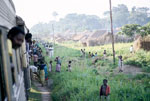
Lubumbashi-Kindu
©2001-2002:
Africa Focus
|
|
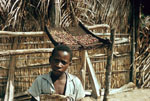
Coffee
©2001-2002:
Africa Focus
|
|
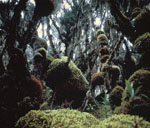
Rain Forest
©1988-2002:
Africa Focus
|
|
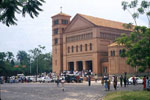
Lumbubashi Church
©1988-2002:
Africa Focus
|
|

Deserted Plane
©1960-2002:
Africa Focus
|
|
Enabling us to improve the quality of the content, if you have additonal information, remarks or suggestions, please share it with us by e-mail.
BRUSSELS/BELGIUM: 30 April 2009:
BRUSSELS AIRLINES flies Africa

In 2002 SN Brussels Airlines was created to continue in the
steps of the two companies Sabena and DAT, who between them had an unequalled safety record. BRUSSELS AIRLINES was created
following the merger of SN Brussels Airlines (SNBA) and Virgin Express. On 12 April 2005, SN Airholding, the company behind SNBA,
signed an agreement with Richard Branson, giving it control over Virgin Express. On 7 November 2006, the new name,
Brussels Airlines, was announced at a press conference at Brussels Airport. Brussels Airlines began operations on 25 March 2007.
On September 15, 2008 it was announced that Lufthansa will acquire a 45% stake in Brussels Airlines with an option to acquire
the remaining 55% from 2011. As a part of this deal Brussels Airlines will join Star Alliance. On March 13, Brussels Airlines
announced that the airline will codeshare all their flights to Germany with Lufthansa. The codeshare agreement will start from March 29.
This new step is part of the integration of Brussels Airlines into the Star Alliance network. Brussels Airlines becomes a
Star Alliance member in 2009.
From 26 April 2002 SN Brussels Airlines opened frequent Africa connections and presently BRUSSELS AIRLINES serves safe and reliable flights to:
ANGOLA (Luanda) - BURUNDI (Bujumbura) - CAMEROON (Douala & Yaoundé) - CôTE D'IVOIR (Abidjan) - DEMOCRATIC REPUBLIC OF THE CONGO
(Kinshasa) - THE GAMBIA (Banjul (Banjul) - GUINEA (Conakry) - KENYA (Nairobi) - LIBERIA (Monrovia) - RWANDA (Kigali) -
SENEGAL (Dakar) - SIERRA LEONE (Freetown) - UGANDA (Entebbe)
For further information click here and please tell them we sent you!
KINSJASA/JOHANNESBURG: 17 December 2002: Peace in DR Congo
Congo's government, rebels and opposition parties signed a peace accord Tuesday to end four years of civil war and set up a transitional government to lead Africa's third-largest nation to its first democratic elections since independence in 1960. Under the accord, mediated by South Africa, Congo President Joseph Kabila will remain the interim head of state until the elections can be held in about 30 months. "The agreement will help bring stability to the entire region." Chances for success of this accord also have been bolstered by the withdrawal of all but a handful of the tens of thousands of
foreign soldiers who took sides during the civil war. Under the deal, the interim government will also include four vice presidents named from the government, the two rebel groups and the political opposition.
Congo's civil war has left an estimated 2.5 million people dead, mainly from war-induced hunger and disease. Congo is a resource-rich nation about the size of Western Europe. The peace deal was signed in the South African capital shortly after 2 a.m. Tuesday when negotiators approved a list assigning ministries to the various groups. The Ugandan-backed rebels agreed to give up the finance portfolio to the government in exchange for the presidency of the 500-member national assembly, delegates at the talks said. Civil society representatives will choose the head of the 120-member senate. The talks were a continuation of earlier negotiations held at the South African resort of Sun City in which rebels and the government agreed to the basic structure of the power-sharing agreement. But the negotiations bogged down over control of the army, police, diplomats and public companies.
The new accord calls for the deployment of a national police force drawn from government-and rebel-held areas to maintain law and order in the Congolese capital. A U.N. force is expected to be deployed in Kinshasa to guarantee the security of rebel leaders when they arrive to take up their new jobs. On Dec. 4, the U.N. Security Council authorized the expansion of the United Nations Mission to Congo, from 5,537 to 8,700 international military personnel. A committee is supposed to work out details of the deal. Congo's war broke out in August 1998 when Rwanda and Uganda backed Congolese rebels in a bid to oust then-President Laurent Kabila. Angola, Zimbabwe and Namibia sent troops to support the government. Kabila was assassinated in January 2001, and the peace drive gained momentum under his son and successor, Joseph Kabila. All but a few of the foreign combatants have withdrawn, but fighting, particularly in the rebel-held northeast and the government-held southeast, continues among rebel splinter groups and tribal fighters.
GOMA, 19 January 2002: GISENYI: Some 450,000 people have fled the region around Goma on the border between Rwanda and the Democratic Republic of the Congo (DRC) after a massive volcanic eruption buried a large part of the city in lava, a Rwandan official said Friday. Most of the people who fled entered Rwanda from the DRC, where the city of Goma was partly obliterated by the lava that began flowing from Mount Nyiragongo on Thursday, but many also fled from adjoining regions in Rwanda.
More information: 
HOUSTON/USA, 12 October 2001: At Landmark’s River Oaks Theatre, starts Friday, October 19 *LUMUMBA*. This gripping political epic tells the story of charismatic leader
Patrice Lumumba, played by Eriq Ebouaney in an electrifying performance that rivals that of Denzel Washington in Malcolm X. Lumumba was the first Prime Minister of the Congo, elected after independence from Belgian colonial rule in 1960. His struggle to hold his vast country together against separatist tribal forces was undermined by covert Belgian and American activities, as well as the ambition and greed of Joseph Mobutu. Filmed on location in Zimbabwe, Mozambique and Belgium by Haitian director Raoul Peck. Cast: Eriq Ebouaney, Alex Descas, Théophile Moussa Sowie, Maka Kotto, Dieudonné Kabongo, Pascal Nzonzi, André Debaar, Cheik Doukouré, Oumar Diop Makena, Mariam Kaba, Rudi Delhem
(Run Time: 1hr 55 minutes)
Belgium accused of killing African hero:
Author urges parliamentary commission to quiz those involved in Patrice Lumumba's murder
(The Guardian published on Saturday January 15, 2000)
Evidence of direct Belgian government complicity in the execution of the Congolese leader Patrice Lumumba must be made public and those implicated questioned, a historian demanded yesterday. Lugo de Witte, a Flemish expert on Africa, called for a parliamentary commission of inquiry to hear testimony under oath from former officials involved in the 1961 killing of one of Africa's most charismatic post-colonial leaders. His 400-page book, just published in French, throws new light on one of the darkest chapters in Belgium's long and rapacious relationship with Congo, and establishes clear state responsibility for a brutal political murder. Lumumba - popular, articulate and a hero of the anti-colonial struggle - was just 36 when he became the first prime minister of the inde pendent Congo in June 1960. But within a month a civil war erupted, provoked by the attempted secession of the copper-rich Katanga province, led by Moise Tshombe. Tshombe recruited Belgian, French and South African mercenaries to fight the government. United Nations forces intervened in the biggest peacekeeping operation the UN had mounted since being founded, but they did little more than maintain the status quo. Lumumba was deposed and an unknown colonel called Joseph-Desire Mobutu took control of country, which he renamed Zaire, and remained a faithful friend of the west until his overthrow in May 1997. The United States saw the militant nationalist Lumumba as a communist sympathiser; CIA involvement in plans to kill him has been long established by senate hearings and declassified documents. But Mr De Witte's research showed that by the time Lumumba was killed Washington had little ability to operate on the ground in Congo and had given way to Brussels. "Belgian officers had direct resposibility for his assassination," he insisted yesterday. A document signed by the then Belgian minister for Africa, Harold Aspremont Lynden, in October 1960, said explicitly: "The main objective to pursue, in the interests of the Congo, Katanga and Belgium, is clearly the final elimination of Lumumba." On January 17 1961, Lumumba, under arrest by Mobutu's forces, was transferred to Katanga on a Sabena plane on the orders of Aspremont Lynden and the Belgian foreign minister, Pierre Wigny. He was assaulted in the presence of Belgian officers and tortured in a villa guarded by Belgian troops, before being shot by an execution squad supervised by a Belgian captain. His body was exhumed by a Belgian police commissioner, Gerard Soete, and dissolved in acid. In a macabre twist, Mr Soete admitted on Belgian television last year that he had kept two of the victim's teeth, prompting calls for their return to Congo. But he insisted he had later thrown them into the North Sea.
Much is now known about this 40-year-old mystery, but crucial information remains buried in Belgian government files, including the records of a secret Congo committee which met under the chairmanship of then prime minister, Gaston Eyskens. Last month the government approved the creation of a parliamentary commission to investigate the episode, but its precise terms of reference have yet to be decided. "Any inquiry must have the power to conduct new research," Mr De Witte said. "It is often assumed that the Belgian officials involved in the affair are dead, but that is not so. These people must be questioned under oath, and if that can be done there will be many more revelations." After his death Lumumba became a powerful symbol of the anti-colonial struggle. A university named after him was established in Moscow and became a magnet for students from the third world. In his political testament, written in jail shortly before he was killed, he reflected: "One day history will have its say, but it will not be the history they teach at the UN, in Washington, Paris or Brussels, but the history they teach in countries freed from
colonialism and its puppets. "Africa will write its own history, and it will be one of glory and dignity." L'Assassinat de Lumumba, Ludo de Witte, editions Karthala Paris.
(Source: The Guardian Saturday January 15, 2000)
Kinshasa 16 January, 2001: LAURENT KABILA ASSASSINATED
Laurent Kabila, president of the troubled Democratic Republic of Congo, was shot and killed last Tuesday.
Last update: 30 April 2009
|











